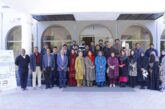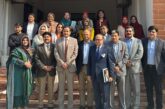Peshawar: Alamdar Husain has recently lost four close relatives in target killing incidents in Peshawar, and he believes that he knows where their killers live: just outside the walled city of Peshawar.
“The areas on Circular Road, including Beri Bagh, Akhunabad, Zargarabad, Waliabad, Wazirbagh and Rasheed Garhi, are infested with militants linked to outfits involved in sectarian killings,” said Husain, who lost his uncle and three cousinsin the recent wave of sectarian violence in Peshawar. His cousins Safdar Abbas and Wajid Hasan were eyewitness to the murder of two members of Shia community, Dr. Saqlain and Muhammad Abbas, gunned down on February 22, 2010.
Dr Tanveer Mustafa, a Superintendent of Police (SP), told News Lens Pakistan that pockets of militants exist all over Peshawar city. However the areas outside Yakatoothave, comparatively, massive presence of militants. “They [militants] have presence in areas outside Yakatoot with facilitators and supporters there,” said Mustafa.
Mustafa, nevertheless, sounds optimistic about the ability of the law-enforcing agencies to weaken the network. He believes that the newlaw passed by the provincial government—Khyber Pakhtunkhwa Restriction of Rented Buildings (Security) Act—would help authorities collect data on those living in the rented houses. Under the law, he said, those providing shelter to the militants would also be liable to be tried under the anti-terrorism law.
However, an official of Intelligence Bureau, who declined to be named due to the sensitive nature of his job, says that conducting operations in these densely populated areas is not an easy task. “You will need the entire police force of Peshawar because cordoning off complete neighbourhoods for operations is not a child’s play. These areas are spread so wide they cannot be not properly be plugged,” he says.
“Close proximity of neighbourhoods on Circular Road to the Ring Road and Kohat Road make them attractive for those seeking shelter in these areas. They can easily escape from these areas to Khyber Agency and the Frontier Region of Peshawar [federallyadministered tribal areas],” he says.
On November 14, the law enforcing authorities killed two men Muhammad Zahir and Shahzad in Wazir Bagh area in the suburbs of Peshawar where they were hiding in a house.According to police they were “terrorists linked to an outlawed militant outfit.”
Another source in Intelligence Bureau, requesting for anonymity, told News Lens Pakistan that both terrorists belonged to Lashkar-i-Jhangvi, an anti-Shia militant organization. “Both of them were involved in target killing of Shia community members in Peshawar”, he said.
Ali Abbas, a Shia elder in Peshawar, alleged that most of the shooters involved in target killings are hired assassins hailing from areas other than Peshawar. “The people in Peshawar’s suburbs provide them shelter and logistical support,” he says, adding that so far there is no data available with the police or any other security agency about the locals providing shelter to the killers.
Abbas believes that only a massive military operation like Zarb-e-Azb in North Waziristan can rid these areas of militants and save the Shia community from target killing. “These areas are to Peshawar what North Waziristan is to the rest of the country. If you are committed to securing Peshawar from suicide killing, extortion and kidnapping, you need to go for a comprehensive operation in the areas on Circular Road, bordering the walled city of Peshawar,” he says.
From Waliabad to Rasheed Garhi, says Abbas, the whole area is infested with militants of Lashkar e Jhangvi and operatives of the Mohmand chapter of Tahreek Taliban Peshawar, led by the dreaded commander Umer Khalid Khurasani.
On the other hand, an Intelligence Bureau’s insider, says that launching operation in these densely populated areas is not an easy task. “After every killing of a member of Shia community,we demand of the provincial chief minister and inspector general of police to carry out a comprehensive military operation in these areas but so far no action has been taken, due to the reasons best known to them.”
(Names of the members of Shia community have been changed to protect their identity.)




